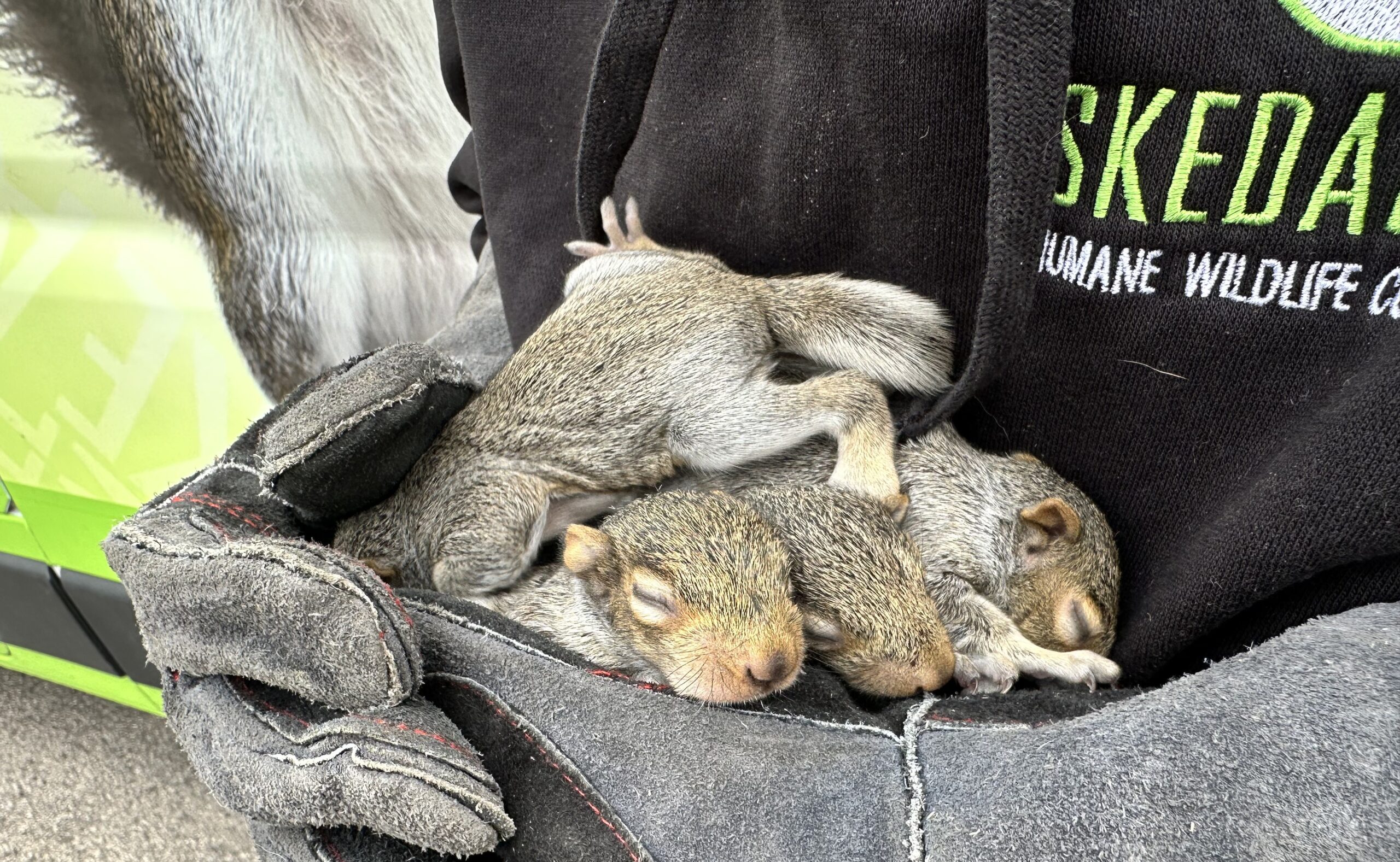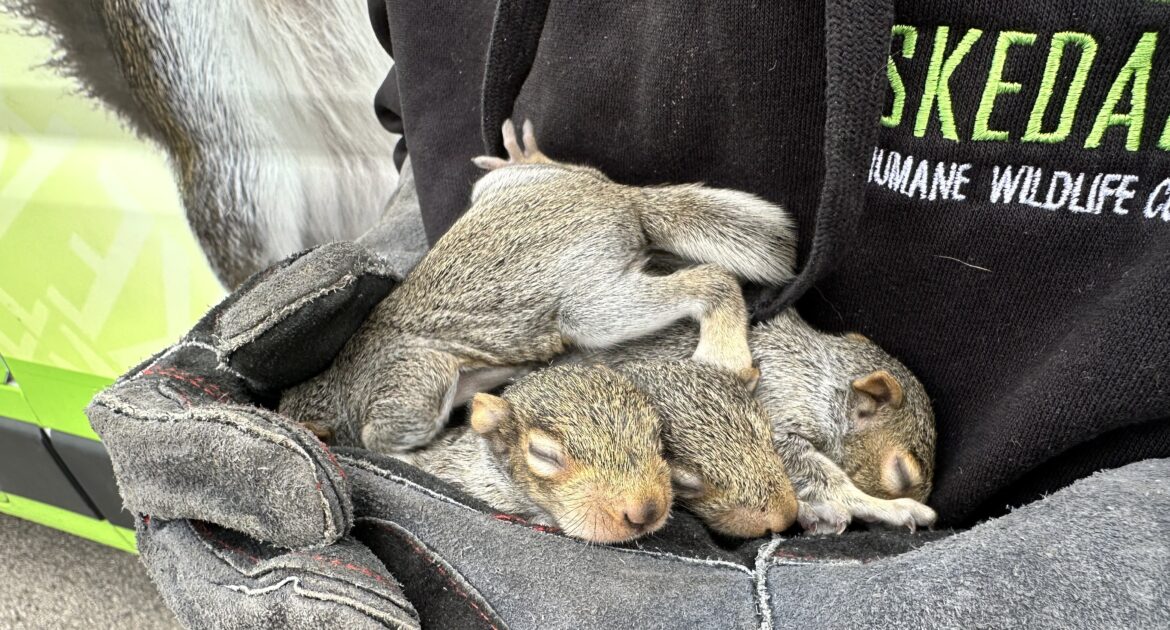It’s no fun to hear the sound of tiny claws scampering inside your walls. Many Columbus homeowners discover the alarming reality of squirrels chewing through walls only when they hear mysterious scratching or notice small holes appearing around their home’s exterior. These resourceful rodents can indeed gnaw their way through various building materials, creating entryways that lead to bigger problems.
Squirrels chewing through walls is more common than you might think, especially in older neighborhoods like Upper Arlington where mature trees provide easy roof access. As the seasons change, these persistent creatures seek warm, safe spaces to nest—and your home’s walls might be their next target.
At Skedaddle Humane Wildlife Control, we’ve spent over 30 years observing how squirrels interact with homes. In Columbus squirrels can persistently forge unwanted entrances into your living spaces. Let’s explore what makes these furry intruders so capable of breaching your home’s defenses and what you can do to protect your property.
Why Do Squirrels Chew Through Walls?
Understanding squirrel behavior helps explain their determination to get inside your home. These aren’t random acts of destruction—squirrels chew through walls with specific purposes in mind.
- Shelter Seeking: Particularly in fall and winter, squirrels look for warm, protected spaces to escape harsh Columbus weather conditions.
- Nesting Opportunities: Female squirrels seek quiet, undisturbed locations for delivering and raising their young—your walls provide ideal nursery conditions.
- Dental Maintenance: Squirrels have continuously growing incisor teeth that require constant filing down through chewing activity.
- Food Storage: Squirrels are notorious for creating caches of nuts and seeds for winter—your walls might become their personal pantry.
Natural instinct drives squirrels to gnaw on materials—it’s hardwired into their behavior and isn’t something they can control or ignore. Previous squirrel infestations leave behind scent markers that attract other squirrels to the same entry points. The combination of these factors makes your home particularly vulnerable during seasonal transitions when squirrels are most actively seeking new shelter.
What Building Materials Can Squirrels Chew Through?
You might be surprised by a squirrel’s chewing capabilities. These small rodents possess remarkably powerful jaw muscles and teeth that can tackle various home construction materials.
Common Materials Vulnerable to Squirrel Damage
- Wood and Trim: Squirrels easily chew through wooden siding, fascia boards, and trim—even hardwoods aren’t immune.
- Vinyl Siding: While more challenging than wood, determined squirrels can create holes in vinyl siding, especially at seams or joints.
- Aluminum: Surprisingly, squirrels can gnaw through thin aluminum vents, flashing, and even some types of aluminum siding.
- Plastic: Ventilation covers, PVC pipes, and plastic building components offer minimal resistance to squirrel teeth.
- Drywall: Once inside, squirrels make quick work of interior walls, creating holes between rooms or into ceiling spaces.
Roof composition, including asphalt shingles, underlayment, and even some roofing membranes, can be compromised by persistent chewing. While not a structural material, squirrels shred insulation to create nests, significantly reducing your home’s energy efficiency. At Skedaddle, we’ve witnessed firsthand how squirrels require only a small opening—about two inches in diameter—to squeeze their flexible bodies into your home. Their ability to widen tiny cracks or ventilation gaps makes virtually no area of your home immune to entry.
Health Risks of Squirrels Nesting in Your Walls
Squirrels’ propensity for nesting in walls is often overlooked as homeowners focus on the structural damage. However, this nesting behavior creates significant health hazards.
- Parasites and Pests: Squirrels carry fleas and ticks that can infest your home and potentially transmit diseases to humans and pets.
- Bacterial Contamination: Squirrel droppings and urine contain bacteria that can contaminate insulation and home surfaces.
- Allergen Introduction: Squirrel fur, dander, and nesting materials can trigger allergic reactions and respiratory issues in sensitive individuals.
- Fire Hazards: When squirrels chew through electrical wiring in walls—a common behavior—they create serious fire risks through exposed wires.
While less common than with some other wildlife, squirrels can potentially harbor diseases transmissible to humans. Extended exposure to squirrel waste accumulated in wall voids can contribute to indoor air quality problems.
Signs Squirrels Have Chewed Into Your Walls
Recognizing the early warning signs of squirrel intrusion can help prevent extensive damage. Here’s what Columbus homeowners should watch for:
Visual Indicators
- Entry Holes: Look for chewed openings approximately 2-3 inches in diameter, especially where pipes or wires enter your home.
- Gnaw Marks: Fresh chew marks around vents, eaves, or soffits indicate active squirrel activity.
- Damaged Vents: Bent, chewed, or pushed-in vent covers are common squirrel entry points.
- Nesting Materials: Leaves, twigs, insulation, or paper debris around your foundation or roof edge suggest nest-building activity.
Auditory Clues
- Running Sounds: Quick scampering noises, particularly in mornings and evenings.
- Scratching in Walls: Distinctive scratching or gnawing sounds from inside walls or ceilings.
- Vocal Noises: Squirrels communicate with various chirps and chatters, especially when babies are present.
Timing Patterns
- Daytime Activity: Unlike mice, squirrels are primarily active during daylight hours. Hearing noises consistently during the day often points to squirrels.
- Seasonal Patterns: Increased activity during early spring (February-April) and late summer (August-September) coincides with squirrel breeding seasons.
- Weather-Related Changes: Sudden increases in activity before storms or cold snaps as squirrels seek shelter.
Preventing Squirrel Damage to Your Home’s Walls
When it comes to squirrel-proofing your home, prevention is always more cost-effective than remediation. Here are proven strategies for preventing squirrel damage.
Exterior Modifications
- Trim Tree Branches: Maintain at least a 10-foot clearance between tree limbs and your roof to eliminate natural bridges.
- Install Roof Edge Guards: Metal flashing along roof edges discourages climbing and access.
- Secure Vents and Openings: Use sturdy metal screening (not plastic) over vents, chimneys, and other potential entry points.
- Repair Existing Damage: Promptly fix small holes or damaged areas before they escalate into larger entry points.
Regular maintenance is essential; inspect your home’s exterior seasonally for signs of new damage or vulnerability. Consider deterrents like motion-activated devices or predator urine products. While results vary, some homeowners find success with these measures.
Professional Assessment
At Skedaddle, we recommend a professional home assessment to identify hidden vulnerabilities. Our 35-50 point inspection process often reveals potential entry points that homeowners easily miss, particularly in Upper Arlington’s older homes with complex architectural features. We focus on identifying and securing all possible entry points—from foundation to roof—since squirrels are remarkably adaptable and will exploit any available opening.
How Skedaddle Handles Squirrel Wall Invasions
Skedaddle offers comprehensive solutions for preventing and addressing squirrel invasions. Our team of trained professionals uses humane and effective techniques to safely remove squirrels and prevent future infestations. With over 30 years of experience, we are equipped to handle even the most challenging situations with care and precision.
If you suspect squirrels are causing damage to your walls, acting quickly can prevent more extensive problems down the road. Do not wait until it’s too late; contact Skedaddle today for a thorough inspection and expert wildlife control solutions.
Squirrels might be resourceful and persistent, but they don’t stand a chance against our proven strategies. Protect your Columbus home from unwanted guests and keep your family safe from health hazards today. Call Skedaddle and ensure your property remains secure against squirrel intrusions.




